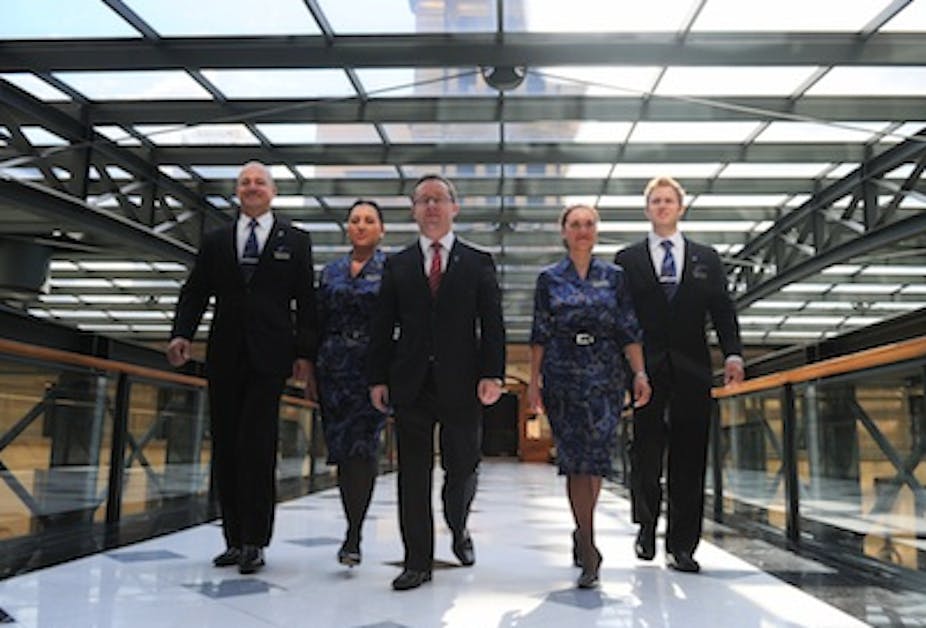It is possible to rebuild relations after major disputes. British Airways is currently trying to do just that after a long industrial-relations dispute with many of its flight attendants.
Qantas’s CEO Alan Joyce insists that he had no alternative other than the “nuclear option” - grounding his entire fleet without notice.
He could have shown more consideration to such stakeholders as the government, passengers and the workforce, at least by giving notice. Instead Joyce chose to consider only the interests of shareholders, rather than those of its other stakeholders. We should encourage Joyce to adopt a more enlightened view of corporate social responsibility!

Some analysts have applauded his tactics as winning a battle with what he calls “rogue unions”. But will this become a hollow victory? Instead of a quick victory over its staff, it is more important for Qantas to survive in the longer-term as a world-class Australian airline in an increasingly competitive market. To do so depends on engaging with its workforce.
At the recent AGM, Qantas shareholders endorsed the current management strategies and huge pay increases for its CEO Alan Joyce. This is anomalous when we consider that Qantas’ share prices have fallen under his watch. Further, Qantas is in serious conflict with several of its key stakeholders: the government, passengers and important groups of the workforce.
So how can Qantas go about rebuilding its relations with its workforce?
Extend the olive branch
Alan Joyce could offer a symbolic “olive branch” to the workforce who perceive that he is adopting “double standards”, treating them unfairly, by waiving his recent huge pay increases. Instead he could accept the same level of pay increases that he is offering to Qantas’s staff. That would demonstrate a different form of leadership, more in keeping with notions of fairness, justice, trust and democracy that pervade the wider society in which we live.
Work together
Moreover, having concluded that Qantas International faces economic problems, another way forward would be for Joyce to listen to the “voice” of the workforce. For instance, he could convene a joint working party (JWP), including the unions (perhaps with government representatives too).
He could share information with the JWP and request help from mediators if the JWP could not reach consensus. Such a JWP could develop alternative strategies to its apparent plans to outsource more aspects of operations in Australia and overseas. If Qantas were to develop a strategy that the workforce were engaged with, it would then be easier to implement such a new strategy successfully. This is especially important in enterprises like airlines that directly face their customers.

Give staff a voice
Where staff have a voice and are engaged, they are more likely to give great service to customers. Conversely, if customers receive poor service they are more likely to use another airline that provides better service. This is not “pie in the sky”; there are airlines where the CEO strives to win the engagement of staff. This involves a medium to long term-commitment to such a strategy; it is not a quick fix that will deliver immediate returns. But after this major dispute, it would soon be timely for Qantas to try to start trying to introduce a change in its culture.
Learn from others
A demonstration that engaging with employees can be a source of competitive advantages is Southwest Airlines. Southwest is a similar size to Qantas in terms of its number of staff. It is based in the USA and is the world’s most successful airline in terms of its relations with its staff and customers. It offers low fares and treats its workforce as a source of value, rather than merely as costs to be cut.
Southwest is consistently successful and has never retrenched any staff. It works co-operatively with its staff and the unions, which represent them. It has high pay and high productivity. Its culture radiates teamwork and two-way engagement between the company and its workforce! Is this example the sort of approach that Australians would prefer to see from what they still see as their “national flag carrier”?
…just like your competitors
Virgin Australia has been trying to learn from Southwest. Qantas too could learn much from Southwest, if it does aim to improve its industrial relations. Let’s hope that this is its aim.
Perhaps, however, Qantas has another aim: to induce a takeover bid. If so, this would follow the example of the former Qantas CEO, Geoff Dixon, and Qantas board. Four years ago they supported an unfortunate attempt by private equity funds to buy Qantas. This could now be easier to achieve than earlier; Qantas’ share price has fallen greatly since then. (Qantas’s current Chairman Leigh Clifford is also an advisor to private equity firm, Kohlberg Kravis Roberts.)
If such private equity funds bought Qantas, the new executive team’s industrial-relations tactics would make Qantas’ recent tactics look mild! The New Qantas would also sell many of its assets, including those it inherited from Australian taxpayers. This could involve the sale of Jetstar and the Frequent Flyer scheme, with fewer services for rural areas.
Might Virgin Australia then become the national flag carrier? Its rhetoric is about creating more jobs in Australia, rather than offshore.

